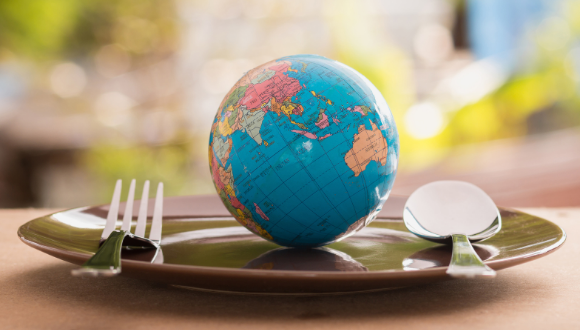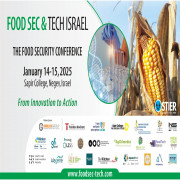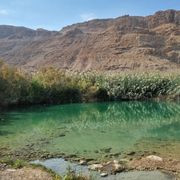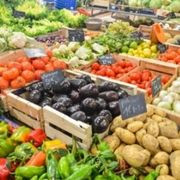World Food Day 2021
October 16th will mark World Food Day. Maintaining food security is a complex task that is affected by many aspects. But not everything depends on science and developers. By Professor Nir Ohad - Head of Manna Center
October 16th will mark World Food Day. This day commemorates the date of the establishment of the World Food Programme under the auspices of the United Nations and the FAO (Food and Agriculture Organization).
The 1996 World Food Conference defined "Food Security as a situation that exists when all people, at all times, have physical, social and economic access to sufficient, safe and nutritious food that meets their dietary needs and food preferences for an active and healthy life”
In 2015, the UN Council set 17 Sustainable Development Goals (SDGs), including: no poverty, zero hunger, clean water and sanitation, good health and well-being. Thus one of the main tasks we face is the elimination of poverty and food security for everyone.
Maintaining food security is a complex task that is affected by many aspects. This task is intensified in the light of the global climate crisis. Climate change develops over a long period of time, but its results are mostly noticeable in the weather changes, changes that occur relatively quickly, resulting among other in heat waves and fires, cold waves, storms and floods. These changes have immediate implications for food security, on a local and global level. In a global world, crop loss on one side of the world has implications not only for the availability of food for those living in the region, but for the entire world, and the global economy. These events have local and global implications, such as mass migration between countries.
The development of the COVID-19 epidemic also contributed to instability in food security, with many in Israel and around the world losing their livelihoods and economic stability. The global consumption and production have changed patterns, product prices and transportation. All those have led to price increases and affected the economy and food security situation worldwide.
Prior to the COVID-19 epidemic in Israel, there were approximately 497,000 families (17.8% of all families) and approximately a quarter of Israeli children living with food insecurity. At the peak of the epidemic, more than a million people (21% of citizens, according to the CBS) reduced their food purchases or skipped meals due to their economic situation.
LATET Organization estimated that 656,000 families were food insecure after the crisis, including 799,000 children (32% of Israeli children), of whom 395,000 were severely food insecure (15.8%).
The Association of Public Health Physicians warned of the damage of this phenomenon in May 2021. Local authorities collapsed under the burden and turned for help to nonprofit organizations that also struggled to cope.
These data illustrate how quickly a food crisis develops, and they highlight the urgent need to set up a government-funded specialist organization to collect and process information and coordinate activities.
In addition to the need to solve the food security crisis at the national and global levels in the present and near future, we must prepare for the years ahead, while paying attention to addressing the climate crisis and finding sustainable solutions to leave a sustainable world for our children.
Researchers and organizations around the world are developing tools to address population growth, declining farmland, dwindling clean water sources, and climate change.
The Manna Center Program at Tel Aviv University promotes food security in Israel and around the world by acting on three levels: Research, teaching, and forging local and international partnerships among professionals and academics to raise awareness and address the issue of food security.
At Tel Aviv University, with the support of the Manna Center Program, researchers have been hard at work developing various tools to address future challenges.
These include:
* Developing sensors that report the physiological status of plants in real time;
* Developing tomato varieties that bear fruit even in extreme heat and drought;
* Developing disease-resistant wheat varieties;
* Developing robotic tools for precision agriculture;
* Developing vaccines against viral diseases in edible fish;
* Promoting alternatives to animal meat through the development of cultured meat;
* Research into livelihood conditions and the measures needed to help poor farmers in developing countries.
These studies and developments are tools in the broad toolbox that will make it possible in the not-too-distant future to increase harvests in an environmentally sustainable way and to cope better with climate change, to the benefit of us all.
Each of us has the opportunity and the duty to help improve our situation. Not everything depends on science and developers.
A conscious and healthy food consumption (for example, the Mediterranean diet), a consumption that is not wasteful and that benefits us and the environment. In this context, it is desirable to promote the consumption of local, fresh food, adapted to our local nutritional needs, ensuring the supply as much as possible, without dependence on import and strengthening the local economy.
In recent years we have seen positive changes in food consumption, such as the reduction of processed foods high in salt, sugar and fat in favor of fresh foods, a welcome process led by the Ministry of Health. This trend will increase when healthy foods, such as basic vegetables and wholemeal bread, which is subsidized instead of white bread, are introduced.
Reducing pollution through the choice of products and packaging we consume, the means of transportation we use, and even more so our financial behavior - choosing to invest in green companies rather than companies that promote fossil fuel.
Each of us can look to our political leaders, as well as our workplace leaders, to promote these issues in policy. In our case, to ask the University to promote these issues as role models.
These actions will help maintain a supportive and sustainable environment and food security for us and our future generations.





